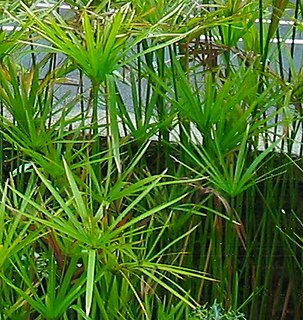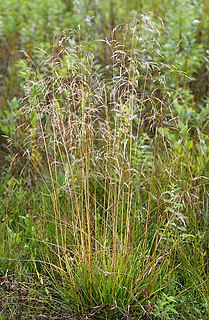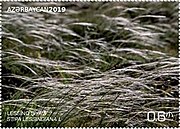
The Royal Horticultural Society (RHS), founded in 1804 as the Horticultural Society of London, is the UK's leading gardening charity.

A beetle bank, in agriculture and horticulture, is a form of biological pest control. It is a strip planted with grasses and/or perennial plants, within a crop field or a garden, that fosters and provides habitat for beneficial insects, birds, and other fauna that prey on pests.

Stipa is a genus of around 300 large perennial hermaphroditic grasses collectively known as feather grass, needle grass, and spear grass. They are placed in the subfamily Pooideae and the tribe Stipeae, which also contains many species formerly assigned to Stipa, which have since been reclassified into new genera.

Cortaderia selloana is a species of flowering plant in the Poaceae family. It is referred to by the common name pampas grass, and is native to southern South America, including the Pampas region after which it is named.

Ornamental grasses are grasses grown as ornamental plants. Ornamental grasses are popular in many colder hardiness zones for their resilience to cold temperatures and aesthetic value throughout fall and winter seasons.

Celosia argentea, commonly known as the plumed cockscomb or silver cock's comb, is a herbaceous plant of tropical origin, and is known for its very bright colors. In India and China it is known as a troublesome weed.

Cyperus alternifolius, the umbrella papyrus, umbrella sedge or umbrella palm, is a grass-like plant in the very large genus Cyperus of the sedge family Cyperaceae. The plant is native to West Africa, Madagascar and the Arabian Peninsula, but widely distributed throughout the world. The subspecies Cyperus alternifolius ssp. flabelliformis is also known as Cyperus involucratusRottb.. It has gained the Royal Horticultural Society's Award of Garden Merit.

Deschampsia cespitosa, commonly known as tufted hairgrass or tussock grass, is a perennial tufted plant in the grass family Poaceae. Distribution of this species is widespread including the eastern and western coasts of North America, parts of South America, Eurasia and Australia.

Anemanthele is a genus of plants in the grass family native to New Zealand.

Stipa pennata, common name European feather grass, or Orphan maidenhair is a flowering plant and arid zone sand grass in the grass family Poaceae, which is grown as an ornamental plant for its feathery flowering spikes, common to the Puszta in Hungary and the Devínska Kobyla forest-steppe in Slovakia. Its foliage is green in summer while the flowers are silvery-grey during the same season. It is 60–90 centimetres (24–35 in) high.

Achnatherum calamagrostis is a species of flowering plant in the grass family Poaceae, known by the common names spear grass, needle grass, and silver spike grass. It is an ornamental grass native to the clearings in the mountains of central and southern Europe, which grows in mounds of blue-green leaves and long, silvery plumes.

Jarava ichu, commonly known as Peruvian feathergrass, ichhu, paja brava, paja ichu, or simply ichu, is a grass endemic to Guatemala, Mexico, Costa Rica, El Salvador, Venezuela, Bolivia, Colombia, Ecuador, Peru, Chile, and Argentina, growing extensively in the Andean altiplano. It is used as fodder for livestock, principally South American camelids like the llama.

Celtica gigantea, commonly called giant feather grass, giant needle grass, or golden oats, is a species of flowering plant in the grass family Poaceae, native to southern Europe. It occurs in Spain and other Mediterranean countries. It is still widely referenced in the horticultural literature under its synonym Stipa gigantea.

Stipa pulcherrima, golden feather grass is a bisexual flowering plant in the family Poaceae.

Nassella tenuissima is a species of grass known by the common names Mexican feathergrass, finestem needlegrass, fineleaved nassella, and Argentine needle-grass. It is native to the south-western United States, northern Mexico and Argentina. It is well-matched to climate in Australia and can be harmful to the Australian environment.

Calamagrostis × acutiflora, called feather reed-grass, is a naturally occurring hybrid species of grass in the genus Calamagrostis, occasionally found in Europe and Asia. Its cultivar 'Karl Foerster' has gained the Royal Horticultural Society's Award of Garden Merit.

Ranunculus gramineus, called the grass-leaved buttercup, is a species of flowering plant in the genus Ranunculus, native to the western Mediterranean; Morocco, Algeria, Tunisia, Portugal, Spain, France, Italy, and Switzerland. It has gained the Royal Horticultural Society's Award of Garden Merit.

Jarava plumosa is a species of grass in the family Poaceae, native to the Southern Cone of South America. It has been introduced to other places with a Mediterranean climate; California, Spain, Israel, the Cape Provinces of South Africa, and South Australia. As its synonym Stipa papposa it has gained the Royal Horticultural Society's Award of Garden Merit as an ornamental in spite of its invasive potential.

Nassella charruana, the lobed needle grass, is a species of bunchgrass in the family Poaceae, native to southern Brazil, Uruguay, and northeastern Argentina, and introduced to Victoria, Australia. As its synonym Stipa charruana it has gained the Royal Horticultural Society's Award of Garden Merit as an ornamental.
Jarava pseudoichu is a species of grass in the family Poaceae, disjunctly distributed in Colombia, Venezuela, Bolivia and Argentina. As its synonym Stipa pseudoichu it has gained the Royal Horticultural Society's Award of Garden Merit as an ornamental.




















